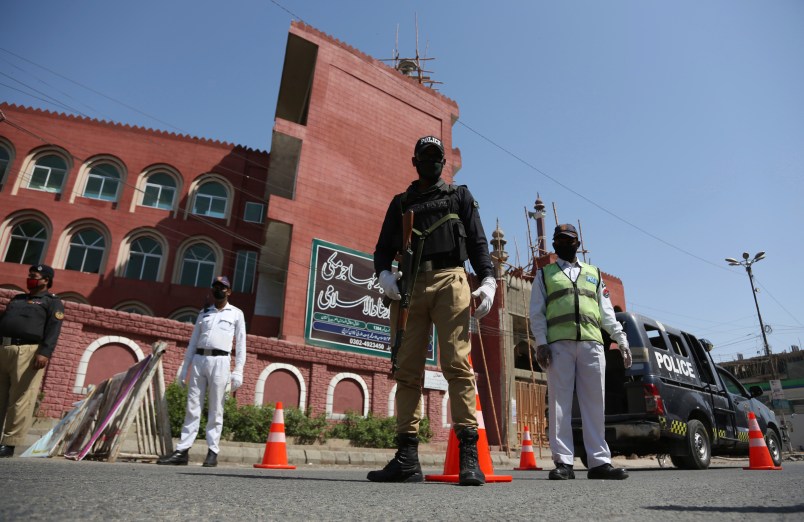ISLAMABAD (AP) — Mosques were allowed to remain open in Pakistan on Friday, when Muslims gather for weekly prayers, even as the coronavirus pandemic spread and much of the country had shut down.
Prime Minister Imran Khan is relying on restricting the size of congregations attending mosques and advice to stay at home from religious groups like the country’s Islamic Ideology Council.
However, some provinces have issued their own lockdown orders to prevent Muslims from gathering for Friday prayers. In southern Sindh province, a complete lockdown is being enforced from noon until 3 p.m., the time when the faithful gather for prayers. Anyone found on the streets will be arrested, according to the provincial local government minister in a statement.
In eastern Punjab province, where 60% of Pakistan’s 220 million people live, checkpoints have been set up in major cities stopping people from congregating.
Still, mosques remain open in Pakistan, even as they have been shut down across much of the Middle East and elsewhere. The Middle East has confirmed over 85,000 cases of the virus and over 3,700 deaths, most of them in Iran.
Iran state TV reported Friday the virus killed another 134 people, pushing the country’s death toll to nearly 3,300 amid more than 53,000 confirmed cases. Iran’s parliament speaker, Ali Larijani, is among those who have contracted the disease.
Pakistan, with 2,450 confirmed cases and 36 deaths, has been sharply criticized for moving too slow to curb large gatherings, including a gathering of tens of thousands of Muslims from several Islamic countries in March. The gathering of Tableeghi Jamaat missionaries is blamed for several outbreaks of the new virus elsewhere in the world. The first confirmed cases that emerged in Gaza were traced to the gathering.
Entire neighborhoods, including outside the capital of Islamabad, have been shut down because clerics who had attended the gathering tested positive for the virus.
Despite this, some religious leaders in Pakistan still urge the faithful to defy restrictions and gather at mosques.
Mufti Muneeb-ur-Rehman, head of a committee tasked with spotting the new moon in Pakistan marking the beginning of holy months such as Ramadan, went on television telling people their faith would protect them and they should attend the mosque.
However, Khan on Friday urged Pakistanis to follow social distancing guidelines and warned against assuming the virus won’t cause large-scale deaths in the country or believing that Pakistanis were somehow immune to the disease. The prime minister also said he would not consider possible easing of restrictions on movement before April 14.
For most people, the virus causes mild or moderate symptoms, such as fever and cough. But for others, especially older adults and people with existing health problems, it can cause severe symptoms like pneumonia that can be fatal.
___
Associated Press writer Munir Ahmed in Islamabad and Amir Vahdat in Tehran, Iran contributed to this report.
___
Follow AP news coverage of the coronavirus pandemic at https://apnews.com/VirusOutbreak and https://apnews.com/UnderstandingtheOutbreak.







Religion, the opium of the people…
Allahu akbar.
Religion and Politics…
Pakistan and Florida…
Korean Church had been a SUPER SPREADER = 5,016 infections
I kinda wish AP would stop using this in their COVID-19 articles. It leads with a “not really a big deal for most people”, focusing too much on the symptoms and not on the spread. How about they just use the raw numbers:
Using deaths/(deaths+recovered) from here: COVID - Coronavirus Statistics - Worldometer
If you must worship, worship in isolation.
This virus doesn’t give a damn about your religion or lack thereof. What this virus wants is to reproduce and in the process, destroy every one of the cells in your lungs. Does your god really believe that you’re better off praising him while you perpetuate a disease?